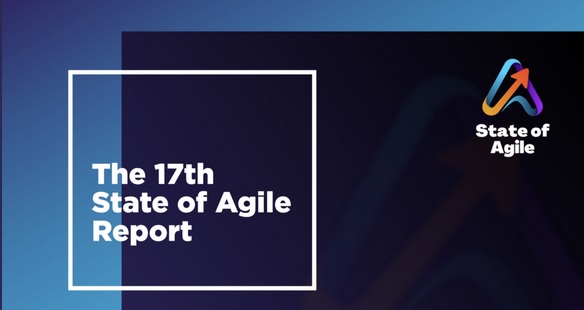webAI and MacStadium(link is external) announced a strategic partnership that will revolutionize the deployment of large-scale artificial intelligence models using Apple's cutting-edge silicon technology.
A majority (71%) use agile in their software development lifecycle (SDLC), according to the State of Agile Report from Digital.ai.

But despite respondents touting improved collaboration and better alignment with the business as top benefits of using agile, these benefits have yet to reach their expected potential. There is an ongoing disconnect between agile practitioners and the business, evidenced by resistance to organizational change, a lack of understanding among leadership, and inadequate training and support from the business side.
Just 11% of survey respondents who use agile are "very satisfied," and 33% are "somewhat satisfied."
Small nimble organizations are the happiest — 52% report enterprise agile works very or somewhat well, and state that agile is a powerful productivity and organizational framework resulting in increased collaboration, improved software quality, and better alignment with the business, compared to 43% of larger companies who agree.
Amidst the ongoing challenges of AI transformations, developer burnout, hybrid work environments, and changing business priorities, requiring development teams to constantly pivot, scaling agile is proving more difficult than anticipated. Agile team leaders are being asked to do a lot from demonstrating business value and enabling digital transformation to incorporating AI and managing distributed workforces, and the results show there is a long way to go before reaching these lofty goals.
Users who are happy with agile point to concrete benefits from its adoption. Almost 60% said collaboration has improved, while 57% saw better alignment to business needs and a quarter saw better quality software delivered.
"What's clear from the data is that, when agile works, it works — there are concrete benefits for the organizations who have gotten it right," said Derek Holt, CEO, of Digital.ai. "AI is the latest disruptive change to businesses, and like any change, it alters processes and practices that will take time to assimilate, but the enterprise goal remains the same — to satisfy the hunger to deliver business value and drive customer satisfaction. Agile still provides us with the best opportunity to manage these transitions and drive software delivery toward maximum business value."
Methodology: 788 people responded to the survey. Just over 30% of survey takers work at companies with more than 20,000 employees while 29% are at organizations with 1,000 or fewer workers.
Industry News
Development work on the Linux kernel — the core software that underpins the open source Linux operating system — has a new infrastructure partner in Akamai. The company's cloud computing service and content delivery network (CDN) will support kernel.org, the main distribution system for Linux kernel source code and the primary coordination vehicle for its global developer network.
Komodor announced a new approach to full-cycle drift management for Kubernetes, with new capabilities to automate the detection, investigation, and remediation of configuration drift—the gradual divergence of Kubernetes clusters from their intended state—helping organizations enforce consistency across large-scale, multi-cluster environments.
Red Hat announced the latest updates to Red Hat AI, its portfolio of products and services designed to help accelerate the development and deployment of AI solutions across the hybrid cloud.
CloudCasa by Catalogic announced the availability of the latest version of its CloudCasa software.
BrowserStack announced the launch of Private Devices, expanding its enterprise portfolio to address the specialized testing needs of organizations with stringent security requirements.
Chainguard announced Chainguard Libraries, a catalog of guarded language libraries for Java built securely from source on SLSA L2 infrastructure.
Cloudelligent attained Amazon Web Services (AWS) DevOps Competency status.
Platform9 formally launched the Platform9 Partner Program.
Cosmonic announced the launch of Cosmonic Control, a control plane for managing distributed applications across any cloud, any Kubernetes, any edge, or on premise and self-hosted deployment.
Oracle announced the general availability of Oracle Exadata Database Service on Exascale Infrastructure on Oracle Database@Azure(link sends e-mail).
Perforce Software announced its acquisition of Snowtrack.
Mirantis and Gcore announced an agreement to facilitate the deployment of artificial intelligence (AI) workloads.
Amplitude announced the rollout of Session Replay Everywhere.
Oracle announced the availability of Java 24, the latest version of the programming language and development platform. Java 24 (Oracle JDK 24) delivers thousands of improvements to help developers maximize productivity and drive innovation. In addition, enhancements to the platform's performance, stability, and security help organizations accelerate their business growth ...




